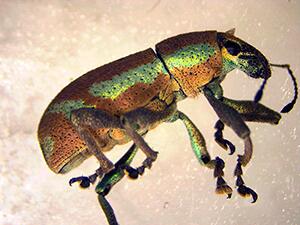WILMINGTON, Delaware – Citrus weevils may be small, but they pose a serious threat, and U.S. Customs and Border Protection agriculture specialists intercepted a species of citrus weevil never reported before in Wilmington, Delaware.
CBP agriculture specialists discovered the weevil on May 22 while inspecting a shipment of pineapples from Honduras. Specialists safeguarded the shipment and submitted images of the specimen to the U.S. Department of Agriculture (USDA) entomologist. The entomologist identified the specimen as Cleistolophus viridimargo Champion, 1911 (Curculionidae), a significant actionable pest. The entomologist also reported that this species was a first-time interception for the Port of Wilmington.
Today, experts at the USDA national pest identifier database confirmed that the Cleistolophus viridimargo Champion, 1911 (Curculionidae) is a first-in-port discovery.
Cleistolophus viridimargo Champion, 1911 (Curculionidae) is a species of citrus root weevil known to occur in Honduras and other Central America locations. Adults feed on the citrus tree or plant while their larvae feed on the root systems, and could potentially damage a $3.4 billion U.S. citrus industry (see USDA Citrus Fruits 2020 Summary).
CBP offered the importer mitigation options and the importer chose to fumigate the entire shipment.
“Customs and Border Protection’s agriculture protection mission is vital to our nation’s economic health, and this first-in-port discovery is evidence of our agriculture specialists’ tireless efforts to intercept potentially dangerous invasive pests,” said Erik Kelling, Acting Port Director for CBP’s Port of Wilmington. “CBP remains steadfastly committed to ensuring our agriculture industries remain vibrant by intercepting hitchhiking invasive insects, and also noxious weeds and animal diseases when we encounter them at our nation’s international ports of entry.”
CBP agriculture specialists have extensive training and experience in the biological sciences and agricultural inspection, and they inspect tens of thousands of international air passengers, and air and sea cargoes being imported to the United States. They are on our nation’s frontlines to ensure our nation’s economic resilience by protecting our critical agricultural resources.
During a typical day last year, CBP agriculture specialists across the nation seized 2,677 prohibited plant, meat, animal byproducts, and soil, and intercepted 240 insect pests at U.S. ports of entry. Read what else CBP accomplished during “A Typical Day” in 2022.
CBP’s border security mission is led at our nation’s Ports of Entry by CBP officers and agriculture specialists from the Office of Field Operations. CBP screens international travelers and cargo and searches for illicit narcotics, unreported currency, weapons, counterfeit consumer goods, prohibited agriculture, invasive weeds and pests, and other illicit products that could potentially harm the American public, U.S. businesses, and our nation’s safety and economic vitality.
Learn more about CBP at www.CBP.gov.
Follow the Director of CBP’s Baltimore Field Office on Twitter at @DFOBaltimore for breaking news, current events, human interest stories and photos, and CBP’s Office of Field Operations on Instagram at @cbpfieldops.
